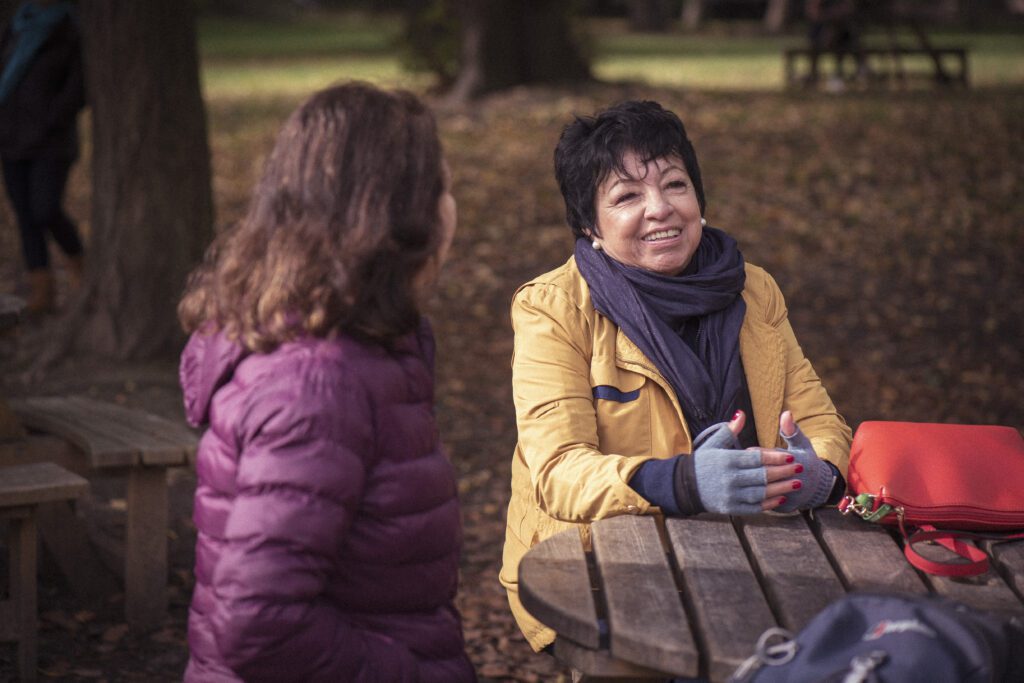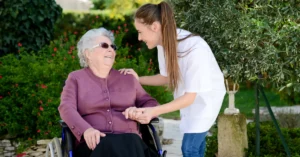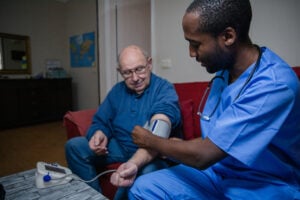Heart care - everything you need to know
According to the British Heart Foundation, over 7.6 million of people across the UK are affected by heart and circulatory conditions, such as coronary heart disease (CHD). Whether you've lived with your heart condition all your life or have been recently diagnosed, managing your heart health in later life can be overwhelming. To help, we've shared where you can access information, support and care in this guide.

Common heart conditions
Coronary heart disease
This is the most common form of heart disease and happens when the coronary arteries become narrower due to the build up of fatty material within their walls. The coronary arteries supply oxygen rich blood to the heart, and the build up can make it a lot harder to get enough oxygen to the heart, which can cause a number of different symptoms or conditions.
Angina
This is the pain and discomfort that happens when the blood flow to your heart is restricted People with angina may describe it as a burning or tight sensation in the chest which can spread to the neck and shoulders. It's a symptom of coronary heart disease which flares up temporarily (angina attack), and can be eased by stopping the activity that brought it on, or by taking prescribed medication.
It can often be managed at home with a combination or medication and lifestyle changes - such as being more active, eating fruits and vegetables, and lowering salt and alcohol intake.
Heart attack
A heart attack - also called a myocardial infarction, is usually the result of coronary heart disease too, and happens when the coronary arteries become fully blocked. Without blood flow the heart can become really damaged, so it's important to call 999 if you think someone is having a heart attack. Common symptoms of a heart attack may include pain, feeling sick, sweaty or clammy, or dizziness and shortness of breath.
If you've had a heart attack you'll likely be kept in hospital for 2-5 days for monitoring and treatment. It can take some time to get back on your feet again and recover emotionally once home. You may also need to make some changes to your daily routine moving forward to help protect your heart.
A heart attack is not the same as a cardiac arrest. Cardiac arrest often happens without any signs, and causes a person to fall unconscious. They may also stop breathing or be struggling to breath. Cardiac arrest requires immediate medical attention.
A heart attack can look quite different in men than in women. Women are slightly less likely to experience chest pain, and instead may present with symptoms such as pain in the jaw, shoulder or back, breathlessness, or feeling sick.
Atrial Fibrillation
Atrial Fibrillation (also known as AF) is the most common type of abnormal heart rhythms. It takes place when the 'atria' - the upper chambers of the heart start to contract rapidly or irregularly which can impact how well the heart pumps blood around the body. People with AF may notice their heart is beating harder or faster, or experience symptoms such as dizziness or pain. AF is a risk factor for stroke, as blood can pool in the heart, become thick and create a clot. AF can also weaken the heart muscle over the time and lead to heart failure.
Heart failure
This is when the heart muscle is weakened to the point it struggles to properly pump blood around the body. Treatment will depend on how severely the heart is damaged / the stage of heart failure a person is diagnosed with. Some people may be able to manage the condition with careful monitoring and medication, while others may need special medical devices, surgery or a heart transplant.
Dealing with a heart condition diagnosis
When you or a loved one is first diagnosed with any medical condition – it’s normal to feel shocked or worried. It can help to find out as much as possible about your condition from the doctor or specialist cardiac nurses providing treatment . They may also point you in the direction of other support services, for example charities such as the British Heart Foundation, Heart UK, or Pumping Marvellous, or local support groups.
If everything happens really quickly, for example you or a loved one is admitted to hospital with chest pain, and is tested for heart disease in order to get the right emergency treatment – it may be harder to process what’s happening or get all the information straight away.
With the right care and support it’s still possible to live an independent and full life . If you find yourself caring for a loved one after a heart attack or heart surgery, there’s support available to help you manage too, whilst also getting them back on their feet.

Facts about cardiac care
- There are more than 7.6 million people living with a heart condition or circulatory disease in the UK (the British Heart Foundation).
- Heart attacks account for around 100,000 hospital admissions each year. That’s equal to one heart attack every five minutes.
- People with a family history of coronary heart disease are statistically more likely to develop vascular dementia in later life.
- Around twice as many people are living with heart and circulatory diseases in the UK than with cancer and Alzheimer’s disease combined.
How to care for someone with a heart condition
Care covers a lot of things and can have different meanings for different families. For some it may mean providing practical support, such as helping someone with the shopping, or helping them to use the bathroom safely. For others, care is more focused on providing emotional support and being there to talk to – but it can also be all of the above and more. Ultimately, caring for someone means helping them build and maintain the best quality of life possible.
Helping a person emotionally who is living with cardiovascular problems may include –
Asking them about how they're feeling
Letting them know there’s no right or wrong way to feel – all feelings are valid. Create a safe, quiet, and private space for them to share their feelings and worries, giving them your full attention. They may find it easier to talk while doing something else, such as sitting in the car, or walking gently in the local park.
Encouraging them to talk to others
Sometimes people find it easier to talk to a professional, a friend, or even a stranger, rather than family. If this is the case, offer to help them find someone they’d feel comfortable talking to – this may mean searching the internet for local charities, helplines, or therapists. If they’d feel more comfortable talking to a friend, arrange to give them some alone time if it’s safe to do so.
Consulting the NHS for free mental health support
It’s not uncommon to experience anxiety, depression, or loneliness when you’re living with a heart condition. NHS England’s Every Mind Matters programme can help a loved one build their own mental health action plan and access tips for managing negative feelings.
Supporting their independence
Instead of taking over all daily activities their behalf, work with them to understand what they are able to do, and look for ways to make certain tasks easier or keep them involved in some way.

Ways you can offer practical support may include –
Maintaining a healthy diet
This means cooking and preparing a heart-healthy diet that provide the right amount of nutrients, in sensible sized portions. Eating a balanced diet is an important step in having a healthy heart, and can help a person to reach and maintain a healthy weight – reducing the risk of developing diabetes or high blood pressure.
Encouraging physical activity
Taking part in regular exercise with someone is a great motivator. Gentle aerobic exercise such as walking and swimming can help to lower blood pressure and resting heart rate. However, the type and duration of exercise will differ from person to person, and it’s always advised that you consult a medical professional before starting something new.
Help with personal care
this may be as simple as helping them get in and out the shower, or helping with fiddly clothes fastenings. If they’ve recently had surgery or are feeling unwell, it may mean actively helping them to wash. It may also mean helping them to manage their medications – providing reminders and ensuring they’re taking the right medication at the right dose, and at the right time.
Help managing the home
this could include chores such as vacuuming, doing laundry, and washing dishes. It may also include offering support with daily life too – such as running errands, picking up prescriptions, and helping them to pay bills.
Supporting other long-term conditions
Around 80 per cent of people with heart and circulatory diseases have at least one other health condition. Managing multiple conditions at once, for example staying on top of medication and getting enough rest can be difficult alone.
Talking to healthcare professionals
This may mean making and managing their appointments and keeping a diary on their behalf, as well as attending appointments with them with their consent. You may also need to consult their healthcare team from time to time if you notice a change in their condition or new symptom.
It's okay to ask for help
It's okay to ask for help
What questions should I be asking?
Whether you’ve recently been diagnosed yourself, or are supporting a loved one who has, you’ll likely wonder what the future holds, how best to manage the condition, and whether you need to make any major changes to daily life. It can be difficult to know where to start, which is why the British Heart Foundation suggests the following questions may be helpful when speaking to healthcare professionals –
- Why do I / the person I care for have a heart condition?
- Will my/ their condition improve or will it get worse?
- Will I/they need any more tests or treatment? If so how often?
- What medicines am I / they taking, and what are the possible side effects?
- How much physical activity should I / they be doing, and how often? What sort of activities do you recommend?
- How often will I / they need to go for appointments at the hospital or with the GP? Will I be sent reminders or need to arrange these myself?
- Will any healthcare providers need to visit us at home?
Care at home after heart surgery
Sometimes cardiac surgery is needed if a heart condition can’t be managed with medication. In the days and weeks after surgery, a person is likely to need a lot more help at home – this may be on a temporary basis, while they recover and get back to grips with normal activity, or be long-term if their condition is unlikely to improve much.
The NHS offer the following suggestions for support after heart surgery –
Follow the cardiac rehabilitation plan provided by your physiotherapist – before being discharged, a person should be shown rehabilitation exercises – such as how to to get in and out of bed, and off a chair.
Be mindful of pain – If you or a loved one attempts an activity and it’s painful, it’s usually a that is a sign that it’s too soon for that specific activity, and someone else may need to step in to do it. Ensure pain medication is taken according to your doctor’s instructions.
Check the wound – look out for redness, swelling, or any signs of infection and raise these with the healthcare team if there’s anything of concern.
Support a healthy sleep pattern – It may take some time to get back into a normal sleeping pattern, so doing all you can to create a restful environment can be key. For example, trying a different sleeping position, or having a controlled afternoon nap.
Be patient – if your loved one had open-heart surgery their body is likely going to take a lot of energy to heal itself, which may leave them feeling worn out. They may also feel a bit low, be aware there will likely be good and bad days.
Looking after yourself as a carer
Caring for someone with a heart condition can be draining. You may feel as though you’re ill-equipped, or unsure how best to juggle your new found responsibilities with work or family life.
Be mindful of –
- Making time for yourself. It’s important to keep doing the things you enjoy.
- Ensuring your own GP know’s you’re caring for someone. They may suggest completing a carers assessment to see if you’re eligible for help to make your role easier.
- Whether you need your employer to be aware, in case you need to work more flexibly
- Don’t be afraid to seek help yourself – whether this is someone to talk to, or a period of respite care to give yourself a break
Care options
Whether it is day-to-day support for a person living with heart problems, or care after a surgery or hospitalisation, there are a variety of home based care options available.
If someone is generally in good health aside from their heart condition, moving into a care home will likely to be unnecessary, as support will be more focused around building healthy habits and maintaining independence, rather than personal care and 24/7 supervision.
Depending on how much help you need, you may opt for weekly care visits for help with specific things like getting out and about or cooking dinner, or live-in care – when a companion moves in with you to help you stick to a health daily routine in your own home.
however, for the most serious of heart conditions – for example if it comes to palliative care for someone living with end-stage heart failure, it may be most appropriate to seek specific nursing care. This can be done in a variety of facilities including nursing care homes.
Elder has been supplying live-in care for my friend Pat for nearly a year, since she came out of hospital after a 4-week stay and surgery. Their service has been brilliant, supplying relief carers when the regular carer has her break, and it has given family and friends peace of mind, knowing Pat was cared for and in safe hands, and given Pat security having someone there in case of little health problems.
Elder Trustpilot feedback
Further support and resources:
Sources:
- https://www.chss.org.uk/heart-information-support/living-with-a-heart-condition/
- https://www.bhf.org.uk/informationsupport/support/support-for-carers/caring-for-a-heart-patient
- https://www.bhf.org.uk/-/media/files/for-professionals/research/heart-statistics/bhf-cvd-statistics-uk-factsheet-jan-2025.pdf
Read more about heart care

What is at-home post-operative care?
Post-operative care, also named convalescent care, is a crucial aspect of recovery following a surgical procedure. This specialised care is tailored to meet the unique

Elderly nutrition: cooking & meal preparation for the elderly
Elderly nutrition: cooking & meal preparation for the elderly Healthy eating should always be a priority, but as we age, our nutritional needs change as

Caring for someone with vascular dementia: how can live-in care help?
How Can Live-in Home Care Help With Vascular Dementia? Vascular dementia is thought to affect around 150,000 people in the UK, making it the second

Stroke Care: How do I Care for a Loved One After a Stroke?
Stroke Care: How do I Care for a Loved One After a Stroke? It can be hard to watch a loved one experience the effects

Hypertension care – caring for a loved one with hypertension at home
Hypertension Care: How do I Care for a Loved One with Hypertension? The right hypertension care is critical to help maintain your loved one’s health.

Coronary Care: What Causes Coronary Heart Disease in the Elderly?
Coronary Care: What Causes Coronary Heart Disease in the Elderly? Coronary heart disease, also known as coronary artery disease, is the most common type of